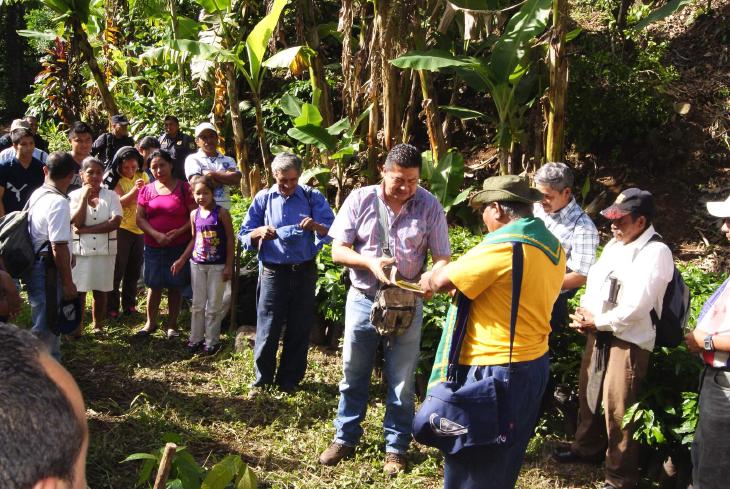Blue Harvest, launched by Catholic Relief Services (CRS) in partnership with Keurig Dr. Pepper and the Inter-American Development Bank, transforms livelihoods and restores land and water resources through Water Smart Agriculture (WSA) in the coffee lands of Central America. Blue Harvest capitalizes on the symbiotic relationship between well-managed coffee agroforestry systems and good watershed management to increase climate resilience, productivity, and profitability for farmers while reducing landslide and flooding risks and contributing to sustainable water access for communities downstream.
Since 2014, Blue Harvest has been working to restore and protect water resources in Central America. They provide technical advice in watershed management, sustainable agriculture production (including coffee), and coffee milling processes that improve water efficiency and wastewater treatment. They provide support to build the social and political processes required for integrated water resources management, and they engage with buyers who are willing to required coffee farmers and their organizations for quality coffees that improve natural resources by implementing the Blue Harvest approaches.
Research conducted by CRS and partners on a subset of coffee farms in Central America over four years demonstrates that, on average, Blue Harvest practices lead to increased yields, increased net incomes, and help mitigate the negative impacts of fluctuations in coffee market prices. On-farm side-by-side comparisons managed by 1,055 coffee farmers in four countries (El Salvador, Guatemala, Honduras and Nicaragua) showed that during the severe drought of 2018, WSA practices improved average productivity by 13% and average net income by 18% when compared with farms applying conventional practices.
Why We Partner
CRS does more than work with farmers on agriculture. They understand the linkage between land management, environmental stewardship, economic livelihoods and how climate change is putting pressure on farmers and communities to either adapt or migrate. They take a holistic and systems level approach to improving not only the farmers but also the water systems of downstream communities.
Impact
Blue Harvest has convened a diverse and strategic network of more than 80 stakeholder organizations to conserve and protect watersheds where coffee is produced, including downstream communities that benefit from sustainable water resource protection. The project has supported five coffee processing plants with water-saving technologies and improved 1,039 on-farm facilities. Blue Harvest also collaborated with farmers and cooperatives to install simple coffee wastewater treatment infrastructure on 33 farms. Together, these efforts save an average of over 33 million liters of water per year. Through a combination of on-farm practice adoption and community water resource protection, Blue Harvest has impacted 66,662 hectares with sustainable soil and water resource management, benefiting over 200,000 people with improved natural resources and access to water.
Blue Harvest Regenerative will scale the adoption of WSA Blue Harvest practices by coffee farmers in critical watersheds in Honduras and Nicaragua. The adoption of WSA Blue Harvest practices will increase productivity and climate/drought resilience of smallholder coffee production. Proven WSA Blue Harvest tools and methodologies will support effective capacity building and technical assistance for sustainable adoption of regenerative practices at scale.
Blue Harvest Regenerative will target a combined total of 138 distinct organizations in Honduras and Nicaragua, including Water Boards (Honduras), Water Committees (Nicaragua), municipal governments, and national agencies (IHCAFE, MIAmbiente, INETER, MARENA, INTA, MAONIC, UNAG, FISE) to deepen and expand partnerships and alliances focused on connecting sustainable land management with the protection and conservation of drinking water resources for coffee farming households and downstream communities.
Updates (2022-2023)
In parallel with our further investment with Root Capital, we are investing in coffee wet mill processing facilities in Nicaragua and Honduras to reduce both water use and contamination of local water sources, and engage youth and women in reforestation activities in coffee producing zones to help protect and conserve watersheds.
